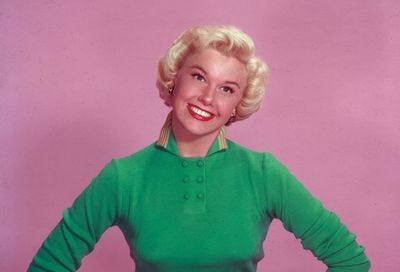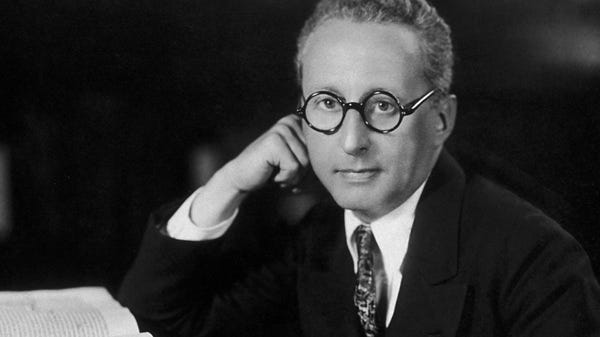Doris Day, Remind Me by Jerome Kern and Dorothy Fields
An Odyssey, as people are apt to forget, is a journey which ends where it began. Odysseus the brave, returning to Ithaca, and loyal Penelope. ‘O sailor! We are overcome by your valour’. It is the first tale, and the greatest, as James Joyce recognised.
So we shall end this year-long survey of great performances from the American Songbook by going back to January, and recalling Jerome Kern for a second innings. Remind Me, sung by Doris Day, with Andre Previn on piano, also has a lyric by Dorothy Fields, which is never a hardship.
The best-known composition by Kern and Fields is The Way You Look Tonight, a beautiful song not always given its due. The most convincing versions are by Fred Astaire (of course) and Ella Fitzgerald, whose Kern Songbook is top-notch. Too often, however, singers wallow in the kind of sentimentality Mr Joyce defined as ‘unearned emotion’. And we don’t want any wallowing.
Fields was the cleverest of the lady lyricists, who got full value from her associations with Kern (A Fine Romance, You Couldn’t Be Cuter) and Jimmy McHugh (I Can’t Give You Anything But Love, The Sunny Side of the Street). Then she popped up by Cy Coleman’s piano stool in the Sixties to write the words for Sweet Charity, and its show-stoppers, Big Spender and The Rhythm of Life. She covered a lot of ground.
Remind Me is not exactly a hidden gem. But it is not performed as often as some other standards. Kern’s melody is one of his strongest, and Fields is at her most playful, from the first breath:
Remind me, not to find you too attractive.
Remind me, that the world is full of men.
Well spotted, Dorothy!
Piano and voice: that’s all there is on this recording. A familiar scene, from a thousand cocktail lounges from Manhattan to Mansfield. Before he followed his heart’s desire to conduct and compose, Previn was a fine interpreter of the standards, and he remained a willing collaborator with female singers throughout a long life.
Day was a big star when they recorded this song in the pivotal year of 1962, after which popular music was never the same. Later the all-American lass was spoken of in the past tense, best-known for Calamity Jane, and its Deadwood Stage, and that rather irritating number, Que Sera Sera. She had a robust voice, more vanilla than cherry, and she serves songwriter and lyricist very well on Remind Me.
Playful to the last, Fields supplies one of the wittiest final verses in that wonderful Songbook:
Although I adore you,
Remind me to ignore you,
You’re one thing I will regret.
So when your charm begins to blind me,
I’ll simply tie my hands behind me.
Don’t let me kiss you, please remind me,
Unless, my darling, you forget.
It’s a classic, alright, from the pen of a composer who did more than any other to establish that Songbook. A bit rich, you think? Well, Kern wrote Showboat, He also gave the world All The Things You Are, Long Ago and Far Away, Smoke Gets In Your Eyes, The Folks Who Live On The Hill, The Song is You, and a dozen more. Richard Rodgers, George Gershwin, Cole Porter and Harold Arlen picked up the baton but the opening laps belonged to Kern and Irving Berlin.
So there we have it. Twelve songs, one for each month. Porter didn’t make the cut, which is a swizz. Lena Horne’s version of I Concentrate on You was one of the first numbers on my provisional list, before I switched to her reading of It Could Happen to You. You can’t include everybody, though Porter, I confess, is an odd omission.
There was no Ira Gershwin. Woe is me! But I wanted Judy Garland singing Do It Again, which Ira’s bro wrote with Buddy Da Sylva. There was no Frank Loesser, for that matter, or Harry Warren, or Stephen Sondheim.
Duke Ellington’s absence was not an oversight. Ellington is the greatest American musician of all, but he belongs to a different tradition. He was a composer, pianist, arranger and bandleader in the world of jazz, and therefore spoke a slightly different language.
There is no right list, but I’m pretty sure I haven’t got it wrong. They’re all great songs, and they’re all terrific singers. Of course it would have been grand to find room for Nat Cole and Barbara Cook. Next time.
Do I have a favourite? Ho ho, it may be Ella Fitzgerald singing Remind Me, which I gave to Miss Day! Or Frank Sinatra’s Here Comes That Rainy Day, which didn’t make it because my song by Jimmy Van Heusen and Johnny Burke was It Could Happen to You. Or Skylark, by Hoagy Carmichael and Johnny Mercer. Carmichael and Mercer made the list; Skylark didn’t.
So I’ll go with Ella’s recording of It Never Entered My Mind by Rodgers and Hart, arranged by Buddy Bregman. I received her R&H Songbook for a birthday 40 years ago, and it remains a personal favourite. The whole record glows – Little Girl Blue, Isn’t it Romantic?, I Wish I Were In Love Again…that was the greatest partnership, Rodgers and Hart.
Mercer is the lyricist I have moved closest to in the past four decades. The songs with Arlen are his best, notably This Time The Dream’s On Me, Blues in the Night, and Out of this World, which Ella covered so well. Every time I hear those songs I recall the hours I spent with Michael Parkinson, who taught me so much about songs and singers.
Thank goodness we have them all, as well as the instrumentalists who found new ways of drawing out their wonders. Cock an ear to two tenorists: Hank Mobley on Berlin’s You Forgot to Remember, and Dexter Gordon on Jule Styne’s Guess I’ll Hang My Tears out to Dry.
Bill Evans must also be there. The great pianist is at his best in Van Heusen and Burke’s But Beautiful, a standard covered by everybody who ever held a microphone. He turns the song inside out, and hands it back gift-wrapped, a present for us all.
What a vault of treasures these men and women bequeathed us. We must be grateful.
Hendo’s Dozen
Fred Astaire: I’m Old Fashioned, by Jerome Kern and Johnny Mercer.
Lena Horne: It Could Happen To You, by Jimmy Van Heusen and Johnny Burke.
Tony Bennett: I Walk A Little Faster, by Cy Coleman and Carolyn Leigh.
Peggy Lee: I’ll Be Tired of You, by Arthur Schwartz and Yip Harburg.
Bobby Darin: Once Upon A Time, by Charles Strouse and Lee Adams.
Judy Garland: Do It Again, by George Gershwin and Buddy Da Sylva.
Frank Sinatra: Ill Wind, by Harold Arlen and Ted Koehler.
Ella Fitzgerald: It Never Entered My Mind, by Richard Rodgers and Lorenz Hart.
Chet Baker: I Get Along Without You Very Well, by Hoagy Carmichael.
Judy Holliday: The Party’s Over, by Jule Styne, Adolph Green, and Betty Comden.
Johnny Hartman: They Say It’s Wonderful, by Irving Berlin.
Doris Day: Remind Me, by Jerome Kern and Dorothy Fields.





